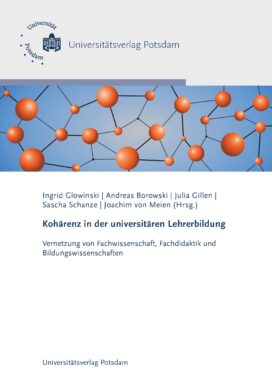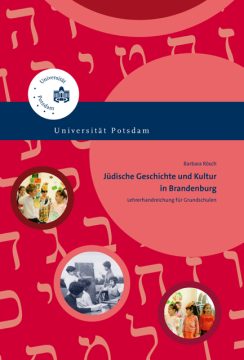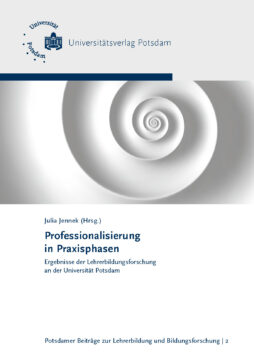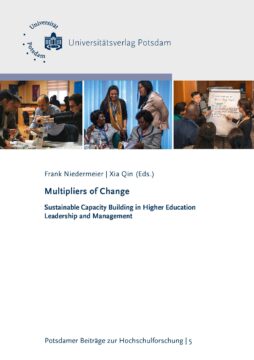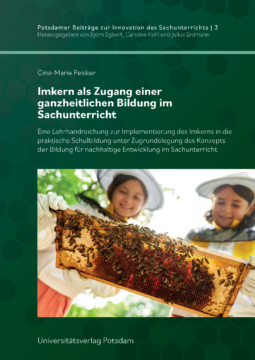One area that is supported by the project “Qualitätsoffensive Lehrerbildung” (funded by BMBF) is the improvement of collaboration and coordination between studies in the discipline, studies in pedagogical content knowledge, and studies in pedagogical knowledge during teacher education at university. Aiming a better coordination among these three parts of teacher education at university, many of the supported projects have designed and realized university-specific approaches.
This conference proceedings volume comprises contributions by 15 of these projects. Seven of those were introduced and discussed in workshops on the occasion of two cross-regional project-conferences in Hannover and Potsdam. Overall, the contributions give a theoretically funded as well as a practice-oriented overview of current approaches and concepts to achieve a better connection between study units concerning studies in content knowledge, pedagogical content knowledge and pedagogical knowledge in teacher education. The volume presents university projects, which take effect on different levels (at the level of curriculum and content, at a collegiate level, at the level of structural conditions of universities). The different approaches are described in a way that they can provide a basis for transfer to other subjects or further universities.
The contributions are aimed at teacher educators as well as other actors working in the field of teaching- and quality development at universities. All of them can take transferable ideas and impulses from the described concepts and formats.
Ingrid Glowinski , Maria Bannert, Christina Beck, Angelika Bikner-Ahsbahs, Robert Marten Bittorf, Bettina Blasini, Florian Boch, Andreas Borowski , Beatrix Busse, Katrin Buth, Anna-Teresa Engl, Janine Freckmann, Jonas Frister, Julia Gillen, Katharina Gimbel, Finja Grospietsch, Gerhard Härle, Katharina Hellmann, Andreas Helzel, Josefine Hofmann, Judith Hofmann, Dietmar Höttecke, Jenna Koenen, Michael Komorek, Verena Köstler, Charlotte Kramer, Eva Kriehuber, Sabrina Kufner, Ralf Laging, Doris Lewalter, Mirjam Maahs, Jutta Mägdefrau, Sebastian Mahner, Nicole Masanek, Jürgen Mayer, Nelli Mehlmann, Monique Meier, Britta-Kornelia Müller, Claudia Nerdel, Verena Niesel, Carina Peter, Tina Pickert, Philipp Pohlenz , Wilko Reichwein, Maria Reißner, Christian Reiter, Chris Richter, Jürgen Richter-Gebert, Andreas Rohde, Sascha Schanze, Silke Schiffhauer, Nina Scholten, Michael Schween, Sandra Sprenger, Peter Stender, Patrizia Ungar, Universität Oldenburg IBIT-Bibliotheksdienste Zeitschriftenstelle, Katja Unverricht, Joachim von Meien, Jana-Kristin von Wachter, Iris Winkler, Carina Wöhlke, Katja Zaki, Kathrin Ziepprecht, Felix Zühlsdorf
Ingrid Glowinski; Andreas Borowski; Julia Gillen; Sascha Schanze; Joachim von Meien (eds.)
Vernetzung von Fachwissenschaft, Fachdidaktik und Bildungswissenschaften
ISBN: 978-3-86956-438-8
397 pages
Release year 2018
33,00 €
Non-taxable transaction according to § 1 (1) UStG/VAT Act in combination with § 2 (3) UStG/VAT Act a. F. Providing this service, the University of Potsdam does not constitute a Betrieb gewerblicher Art/Commercial Institution according to § 1 (1) No. 6 or § 4 KStG/Corporate Tax Act. If the legal characterization of our business is changed to a commercial institution subsequently, we reserve the right to invoice VAT additionally. zzgl. Versandkosten
One area that is supported by the project “Qualitätsoffensive Lehrerbildung” (funded by BMBF) is the improvement of collaboration and coordination between studies in the discipline, studies in pedagogical content knowledge, and studies in pedagogical knowledge during teacher education at university. Aiming a better coordination among these three parts of teacher education at university, many of the supported projects have designed and realized university-specific approaches.
This conference proceedings volume comprises contributions by 15 of these projects. Seven of those were introduced and discussed in workshops on the occasion of two cross-regional project-conferences in Hannover and Potsdam. Overall, the contributions give a theoretically funded as well as a practice-oriented overview of current approaches and concepts to achieve a better connection between study units concerning studies in content knowledge, pedagogical content knowledge and pedagogical knowledge in teacher education. The volume presents university projects, which take effect on different levels (at the level of curriculum and content, at a collegiate level, at the level of structural conditions of universities). The different approaches are described in a way that they can provide a basis for transfer to other subjects or further universities.
The contributions are aimed at teacher educators as well as other actors working in the field of teaching- and quality development at universities. All of them can take transferable ideas and impulses from the described concepts and formats.
Recommended Books
-
 2009
2009Jüdische Geschichte und Kultur in Brandenburg
6,00 €Non-taxable transaction according to § 1 (1) UStG/VAT Act in combination with § 2 (3) UStG/VAT Act a. F. Providing this service, the University of Potsdam does not constitute a Betrieb gewerblicher Art/Commercial Institution according to § 1 (1) No. 6 or § 4 KStG/Corporate Tax Act. If the legal characterization of our business is changed to a commercial institution subsequently, we reserve the right to invoice VAT additionally.
zzgl. Versandkosten
Add to cart -
 2022
2022Julia Jennek, Stefanie Rother, Frank Tosch, Mirko Wendland, Steffen Kludt, Karsten Krauskopf, Dorothea Kitschke, Verena Maar, Michel Knigge, Susanne Gnädig, Astrid Seidel, Karl-Heinz Siehr, Maik Wienecke, Claudia-Susanne Günther, Karen Reitz-Koncebovski, Peter M. Klöpping, Denise Kücholl, Rebecca Lazarides, Andrea Westphal, Frederik Ahlgrimm, Anahit Barseghyan, Ingrid Glowinski, Anna Gronostaj, Dorothea Körner, Linda Kuhr, Jörg-Werner Link, Lynn Scherreiks, Miriam Vock, Jürgen Wilbert, Nicole Zaruba
Professionalisierung in Praxisphasen
19,50 €Non-taxable transaction according to § 1 (1) UStG/VAT Act in combination with § 2 (3) UStG/VAT Act a. F. Providing this service, the University of Potsdam does not constitute a Betrieb gewerblicher Art/Commercial Institution according to § 1 (1) No. 6 or § 4 KStG/Corporate Tax Act. If the legal characterization of our business is changed to a commercial institution subsequently, we reserve the right to invoice VAT additionally.
zzgl. Versandkosten
Add to cart -
 2020
2020Frank Niedermeier, Xia Qin, Marcel Faaß, Ming Yu Cheng, Duu Sheng Ong, Marzuki Mustafa, Hong Tat Ewe, Stefanie Pillai, Sue Lyn Ong, Mohd Basyaruddin Abdul Rahman, Fuchaka Waswa, Elizabeth Abenga, Florence Indede, Katherine Acuña Paez, Carlos Coronado Vargas, Dieudonné Musa Alokpo, Kabiné Oulare, Solveig Randhahn, Luisa Fernanda Echeverría King, Michael Mawa, Tobias Wolf
Multipliers of Change
12,50 €Non-taxable transaction according to § 1 (1) UStG/VAT Act in combination with § 2 (3) UStG/VAT Act a. F. Providing this service, the University of Potsdam does not constitute a Betrieb gewerblicher Art/Commercial Institution according to § 1 (1) No. 6 or § 4 KStG/Corporate Tax Act. If the legal characterization of our business is changed to a commercial institution subsequently, we reserve the right to invoice VAT additionally.
zzgl. Versandkosten
Add to cart -
 2024
2024Imkern als Zugang einer ganzheitlichen Bildung im Sachunterricht
12,50 €Non-taxable transaction according to § 1 (1) UStG/VAT Act in combination with § 2 (3) UStG/VAT Act a. F. Providing this service, the University of Potsdam does not constitute a Betrieb gewerblicher Art/Commercial Institution according to § 1 (1) No. 6 or § 4 KStG/Corporate Tax Act. If the legal characterization of our business is changed to a commercial institution subsequently, we reserve the right to invoice VAT additionally.
zzgl. Versandkosten
Add to cart
Contact
Potsdam University Library
University Press
Am Neuen Palais 10
14476 Potsdam
Germany
verlag@uni-potsdam.de
0331 977-2094
0331 977-2292

